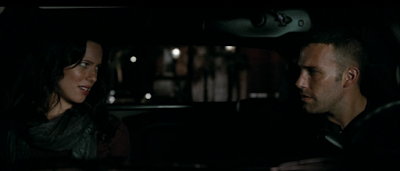September
8, 2010 (Venice Film Festival), and September 17, 2010 (United States), release
dates
Directed
by Ben Affleck
Screenplay
by Peter Craig, Aaron Stockard, Ben Affleck
Based on
the novel Prince of Thieves by Chuck
Hogan
Music by
Harry Gregson-Williams, David Buckley
Edited by
Dylan Tichenor
Cinematography
by Robert Elswit
Rebecca Hall as Claire Keesey
Jon Hamm as FBI Special Agent Adam Frawley
Jeremy Renner as James “Jem”
Coughlin
Blake Lively as Krista “Kris”
Coughlin
Chris Cooper as Stephen MacRay
Pete Postlethwaite as Fergus “Fergie”
Colm
Slaine as Albert “Gloansy” MacGloan
Owen Burke as Desmond “Dez” Elden
Titus Welliver as Officer Dino
Ciampa
Dennis McLaughlin as Rusty
Brian Scannell as Henry
Isaac Bordoy as Alex Colazzo
Jack Neary as Arnold Washton
Edward O’Keefe as Morton Previt
Victor Garber as David
Produced
by Legendary Pictures, GK Films, Thunder Road Pictures
Distributed
by Warner Bros. Pictures
The
Town has it all—and
then some—for a neo-noir: honor among thieves, betrayal, murder, bank
robberies, armored car heists, loyalty to family and friends, and romance. The Town
is based on the 2004 novel Prince of
Thieves by Chuck Hogan. I have read Hogan’s novel (I am already planning to reread it so that I can post about it). I
enjoyed the novel even more, but the film is also a great story. A little bit
different from the novel, but a great story all the same. The writers did a
wonderful job adapting it to the screen.
I have
always wondered if Chuck Hogan borrowed from George V. Higgins, who wrote The Friends of Eddie Coyle (it is the
basis of the movie by the same name). The similarities between the two films
are even more striking, as I mentioned in my blog post dated April 28, 2016.
Here are the examples I mentioned in April:
• Use of
masks in the heists.
• The
robbers don’t want to hurt anyone; they just want the money. In The Town, Jem Coughlin is an exception.
• The
bank manager, Mr. Partridge, is blindfolded in the first heist in The Friends of Eddie Coyle, as is Claire
Keesey in The Town.
• After
the first heist in each movie, the bank manager is left at the beach. In The Friends of Eddie Coyle, Mr.
Partridge (the bank manager) is told to walk until he finishes counting to 100,
and he heads toward the water. In The
Town, Claire Keesey (the bank manager) is told to keep walking until she
feels the water on her toes (she is barefoot because the robbers took the bank
employees’ shoes during the robbery).
In both
the novel by Chuck Hogan and in the film, I rooted for Doug and his friends,
his partners in crime. In the film, when they pulled the armored car heist in
the North End of Boston, I wanted them to escape: I wanted them to make it
across the Charlestown Bridge. But I’ll admit, it was mostly because I was
rooting for Claire and Doug. If Doug got caught, what would happen to Claire?
When it
came to rooting for Doug, the human interest elements helped the most for me.
The romance angle was only one part of it. In addition were family
complications, emotional debts left unpaid, childhood secrets kept for years.
All of this makes for a complicated yet extremely satisfying story. Even though
I had read the novel before seeing the film and thought I knew the ending, the
film kept me guessing—and changed the ending.
Doug and
his friends grew up and still live in Charlestown, Massachusetts: a place where
fate plays a dominant role in the lives of the people born there. One of the
quotes that opens the film tells viewers, “Bank robbery became like a trade in
Charlestown, passed down from father to son.” And almost immediately after,
Doug, in voice-over, tells viewers about the next bank robbery he and his
friends are about to commit. The bank robbery is also the moment that Doug
meets Claire Keesey, although he is already familiar with her work routine as
part of his planning for the bank job.
(This blog post about The Town contains spoilers.)
As I recall, the film adheres pretty
closely to the book. The film, however, streamlines some details about siblings
Krista and Jem Coughlin, and the plot details surrounding FBI Special Agent
Adam Frawley are minimized to make him less central to the plot, but the
romance between Claire and Doug is left almost intact. I say “almost” because
the film’s ending is a complete change compared to the book. I don’t want to
say that it’s any less satisfying because I enjoyed the film immensely, but the
book stays true to the characters and to the circumstances of their lives.
Part of the tension in the story
comes from the relationship between Claire and Doug and all the events Doug
sets in motion just by reaching out to her. She may have moved into Charlestown,
but she is a newcomer and not one of Doug’s friends—and probably doesn’t want
to know them. She represents everything that’s new and upscale, everything that
Doug’s friends, especially Jem, resent. They have always lived from hand to
mouth in crowded projects. Now people like Claire are moving into renovated
homes that Doug and his friends cannot afford (unless they keep robbing banks
and never get caught) and being pushed to the fringes of their own
neighborhoods. Doug and Claire face social obstacles, to say nothing of the
obstacles imposed by his chosen profession of bank robber.



No comments:
Post a Comment